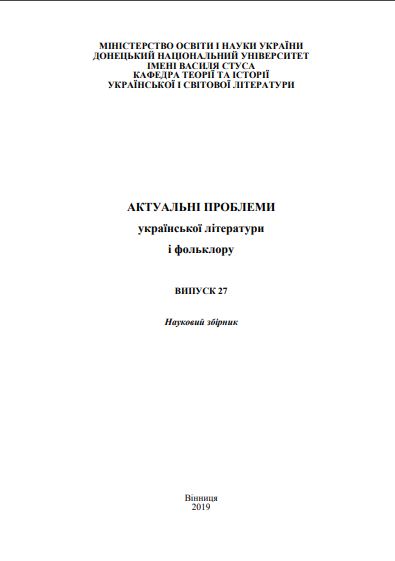Semiosis of the mirror in lyric’s text poetics: the gender aspect.
DOI:
https://doi.org/10.31558/2308-1902.2019.27.8Keywords:
the Ukrainian lyrics of XX th., the image of mirror, the motive of mirror reflection, masculine / feminine mode of writing, the lyric consciousnessAbstract
The article deals with the semantic sphere of the mirror’s image in the lyrics, in particular in the Ukrainian lyrics of XX th. The methodological base consists of the gender studies and semiotic analysis. The combining of these methodological strategies needs to find out some gender and psychological specificity of semantic loading of the things world depicted in literary texts. The image of mirror is often used in lyrics not only in its direct, household meaning, but also in its archetypical, symbolic sense (for expressing “doubling” of a person, his / her “self-alienation”). It’s different in the masculine or feminine modes of writing depended of the psychic gender preferences and cultural influence. In the feminine lyric consciousness the image of mirror is used more active: as interior’s detail with additional mining of luxury and cosiness, because of femininity is grounded in private space; as “prevention” the Other’s look and opinion (the social stereotype is: female appearance determines the value of a personality and can be observed). In feminine lyric narrative the motive of looking in the mirror is connected with the founding by lyric heroine her identity, with her reflection of herself discording with her visible image, with expressing her fear of senescence (L. Paluy, N. Sheyko-Medvedeva, I. Shzilenko, S. Yovenko and others). The image of mirror has limited implementation for masculine mode of writing (for masculine lyric hero his own looking is less interesting because it doesn’t accord with his own value) and mainly focuses the situation of self-examining about (non)successful life realization (as L. Talalay’s poem).References
Чудаков А. Предметный мир литературы. Историческая поэтика. Итоги и перспективы изучения. М.: Наука, 1986. 319 с.
Лотман Ю. Текст в тексте. Лотман Ю. Семиосфера. СПб, 2010.С. 62 – 73.
Савкина И. Разговоры с зеркалом и Зазеркальем: автодокументальные женские тексты в русской литературе І половины ХІХ века. М.: Новое литературное обозрение, 2007. 416 с.
Штолько М. Фемінність поезії Ірини Жиленко. Міжнародна Інтернетконференція «Українська література і загальнослов’янський контекст». Оф. сайт Бердянського державного педагогічного університету. URL: http://www. bdpu.org/scientific_published/ukr_lit_2008 (дата звернення: 05.01.2017)
Жеребкина И. «Прочти мое желание…». Постмодернизм, психоанализ, феминизм. М.: Идея-Пресс, 2000. 256 с.
Червоне і чорне: 100 українських поеток ХХ сторіччя: антологія / укладення Б. Щавурського. Тернопіль: Богдан, 2011. 1344 с.
Жиленко І. Євангеліє від ластівки: вибране з десяти книг / ред. рада: Вал. Шевчук та ін., вступ. ст. та бібліогр. А. Макарова. Х.: Фоліо, 1999. 544 с.
Йовенко С. Любов і смерть: лірика. К.: Ярославів Вал, 2010. 720 с.

